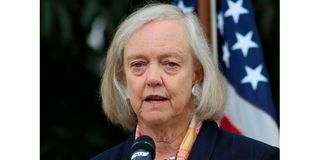Kenyan poll: Diplomats vouch for political inclusivity

US Ambassador to Kenya Meg Whitman during a press briefing at the US Embassy in Nairobi yesterday. Diplomats from Europe and North America have called for an inclusive and equitable political system in the country ahead of tomorrow's poll.
What you need to know:
- 14 envoys in Kenya from Europe and North America have reaffirmed their support for an inclusive and equitable political system .
Diplomats in Kenya have reaffirmed their support for an inclusive and equitable political system in the country ahead of the General Election tomorrow.
In a joint statement dated August 5, the 14 envoys from Europe and North America said they backed a political system that has a representation of women, youth and persons with disabilities.
“We fully support work to build a more inclusive and equitable political system and will continue to do so after this election has concluded,” they said.
A total of 1,962 women, up from 1,240 in 2017, will be competing for various seats in Tuesday’s election. This raises hope of more women making it to the National Assembly and Senate, houses where national laws are passed.
The more the number of women in Parliament, the stronger the numerical strength and lobbying power, crucial to the approval of proposed legislation.
The diplomats said they hoped for a free, fair and peaceful election considering that elections are a celebration of freedom and choice.
Ethnicity
They lauded political parties for signing the peace pledge and charter-Mkenya Daima’s Leadership and Peace Pledge and National Cohesion and Integration Commission’s Political Decency and Peace Charter, which binds them to preach peace among their supporters.
Disputes over election results often stir peace in Kenya
A 2012 study Triggers and Characteristics of the 2007 Kenyan Electoral Violence that used two surveys conducted before and after the election, found that one out of three Kenyans was affected by the violence regardless of their ethnicity and wealth.
And the chances of being a victim of violence were higher in areas with land conflicts and where politically-connected gangs operated.
Of the triggers, the study cited the perception that the election had been rigged, increased support toward lawlessness, reduced trust and social capital among communities.
“We call on leaders - both in and out of the elected offices - to work together after August 9, to ensure the democratic progress of the last decade is preserved,” the envoys said.




